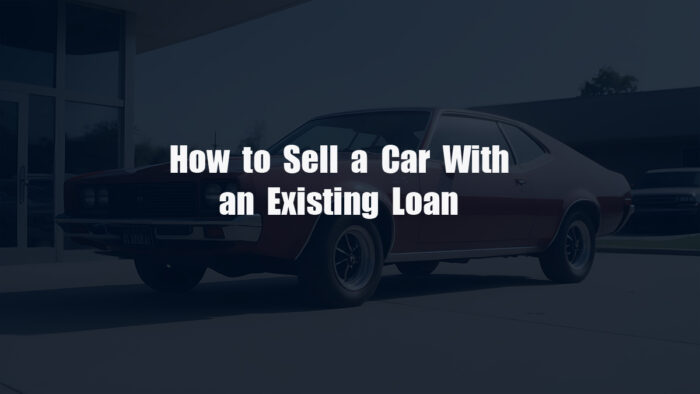Trying to sell your car, especially if you have an existing loan, can seem like an impossible and troublesome task. Besides, the car is not yours completely, and you will not get full ownership unless you pay up your existing loan.

Thus, this makes the process of giving the car keys to a new owner very complicated. Nevertheless, many car owners are deciding to sell their cars before paying up their loans, which is common even in the automotive market.
In the meantime, if you are considering upgrading to a new vehicle, you can just free up some cash, reduce your current vehicle, and sell a car with an existing loan. This is to prove that selling a car when you still have a loan is not impossible.
Rather, if you can handle the process well, you will find that the procedure is relatively easy. This blog post is set to explain and clarify the steps required to sell a car with an outstanding or existing loan.
Can You Sell a Car with an Existing Loan?
The answer is yes. Car owners can sell their vehicles with an outstanding loan. However, the procedures include additional steps compared to selling a car with an already settled or paid-off loan. Additionally, the main challenge that you may face is that the lender of the loan has title to the car as a form of security for the loan. Therefore, if you want full ownership of the car, you will need to pay off the loan completely.
Selling a car with an old loan needs careful coordination and planning. But at the end of it all, it is an achievable and possible process. Just as long as there is uninterrupted and smooth communication between the buyer and the lender, as well as an understanding of how the steps are used, an easy transaction is guaranteed.
How to Sell a Car with an Existing Loan
Selling a car with an existing loan, as mentioned previously, needs extra steps, but that doesn’t mean it is impossible. After all, you just need to understand the necessary steps and carefully perform the transaction to make sure that all parties involved are content with the entire process. Here is an overview of how to go about it:
- Comprehend your payout amount.
- Review your vehicle’s value.
- Search for a buyer.
- Use positive equity during the transaction.
- Manage the transaction with negative equity.
- Partner with a lender.
• Comprehend Your Payoff Amount
One of the ways to sell your car with an existing loan is to comprehend and understand your payoff amount. Thus, before putting up your car for sale, get in touch with the lender to get the payoff amount. However, keep in mind that because of the fees and interest, the amount may be a bit higher than your current balance.
• Review Your Vehicle’s Value
Next, you can use NADA Guides, Kelley Blue Book, or Edmunds, to find out or determine the value of your car. By doing this, you will get an understanding of whether you are qualified to pay up the loan with positive equity or negative equity.
• Search For a Buyer
When making plans to sell your car, there are no limits to the options you have. For example, you can sell it to a dealership, sell it privately, or use any car-buying service. Any of these options can work for you.
• Use Positive Equity During Transaction
When using positive equity for this transaction, here is how it will work: If the value of your car exceeds the payoff amount and you sell the car, you can use a portion of it to pay off the loan and keep the rest as profit.
• Manage the Transaction with Negative Equity
On the other hand, if the loan amount you owe is more than your car’s value, you will be responsible for the difference. Therefore, making payments out of your pocket to make up for the difference will be the case. You can also choose to apply for a personal loan if you do not have enough funds or are under financial strain.
• Partner with a Lender
For a better transaction, it is advisable to partner with or work with a lender. This is because they are professionals, and they can teach you how to manage the sale as well as the title transfer to the new owner.
Helpful Tips for a Smooth Transaction
While performing the processes above, here are some tips you can implement and work with during the whole process:
- Remain organized.
- Transparency is important.
- Prepare yourself to close the gap.
Unquestionably, this whole process needs additional steps, and as long as you are prepared and informed, you can achieve it successfully.
FAQs
What happens to the loan when I sell the car?
When you sell the car, you’ll typically use the proceeds from the sale to pay off the remaining loan balance. Any excess amount after paying off the loan belongs to you.
Can I sell my car for less than the loan amount?
Yes, you can, but you’ll still be responsible for paying off the remaining loan balance. If the sale price is less than the loan amount, you’ll need to cover the shortfall with your own funds.
What if the sale price is more than the loan amount?
If the sale price exceeds the loan amount, you’ll first use the proceeds to pay off the loan. Any remaining amount belongs to you and can be used as you wish.
Do I need to notify the lender before selling my car?
It’s a good idea to inform your lender about your intention to sell the car. They can provide guidance on the process and ensure that all necessary steps are taken to transfer the title smoothly.
What documents do I need to sell a car with an existing loan?
You’ll typically need the vehicle’s title, loan documents, and any relevant paperwork related to the sale. Make sure to check with your local DMV or relevant authorities for specific requirements in your area.
Can I sell my car to a private party if there’s an existing loan?
Yes, you can sell your car to a private party even if there’s an existing loan. However, the process may be a bit more complicated compared to selling it to a dealership. You’ll need to work with the buyer and your lender to facilitate the transaction.
What if I owe more on the loan than the car is worth?
If you owe more on the loan than the car’s current market value, you’re said to be “upside down” or “underwater” on the loan. In this case, you may need to pay the difference out of pocket to clear the loan before selling the car.
Should I pay off the loan before selling the car?
It’s generally advisable to pay off the loan before selling the car, if possible. This simplifies the transaction and ensures that there are no complications with transferring ownership to the new buyer. However, if you can’t pay off the loan upfront, you can still sell the car, but you’ll need to coordinate with your lender and the buyer to handle the payoff.



